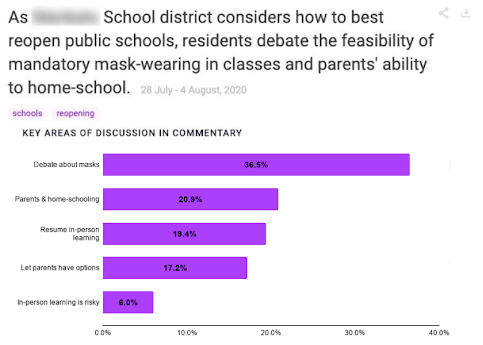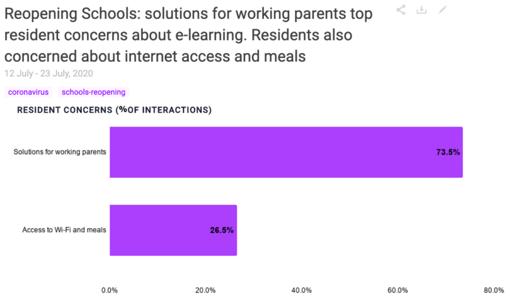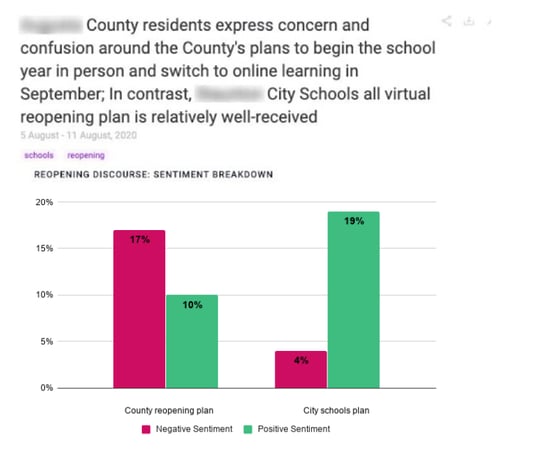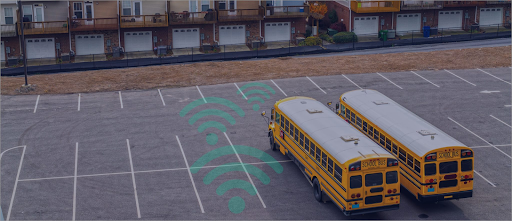Back to School? Residents’ Top 4 Concerns About Reopening Schools During COVID-19
.png)
Zencity
The Platform for Community Trust
Since the onset of the Covid-19 pandemic, schooling and education has been one of the top concerns for families and communities. Facing daunting economic challenges and with the utmost concern for child development and public health, school districts and policymakers must now make unprecedented decisions: from building new policies and procedures to enable in-person learning, training teachers to work online, and ensuring adequate broadband internet access to make e-learning possible.
Parents, teachers, and community members are actively sharing their concerns and questions about school policies online. For decision makers, this presents an enormous challenge: administrators need to both stay on top of issues and questions raised, while making sure that initiatives and health guidelines are properly communicated to residents.
In the months leading up to the beginning of the school year, Zencity has observed an uptick in resident discourse across all of our 150+ partner cities and counties. We analyzed the data and provided local decision makers with insights to help them understand the primary concerns that residents are voicing online. Here’s what we’re seeing below.
Top School-related Concerns and Themes Facing Residents
#1: Wearing Masks in Class
-
- As a Zencity insight for one Minnesota city reveals, this topic leaves many residents divided. While some acknowledged that it would be difficult to enforce but still necessary, others insisted that they will refuse to force their child to wear a mask while learning.

-
- In communities and regions where mask-wearing has been less common, generally in sparsely populated areas, school officials are concerned that coronavirus cases will increase as students return to the classroom.
#2: Working Parent Predicament
-
- A common theme raised across many of our partner cities and counties is the near-impossible situation in which working parents will find themselves if they need to facilitate their child’s online learning.

-
- As analysis for a city in an Indiana town indicates, some residents are worried that they may need to quit their job, or that they will not be able to support their child’s learning whileworking full-time.
#3: Alternative Options and Hybrid Solutions
-
- In response to proposed hybrid-models of learning, parents looked for more information and freedom to choose the most suitable options for their children.
- When a county in Virginia announced its plans to begin the school year in person in August, and later shift to online learning in September, Zencity analysis revealed resident concern and confusion, with 17% negative response. In comparison, when one of the same county’s school districts announced the plan to open the year exclusively with virtual learning, their announcement generated only 4% negative interactions, and 19% positive.

-
- Acting on their residents’ concerns, Louisiana school districts are making necessary changes to account for COVID-19. Desks will be spaced apart in classrooms, and classes are being staggered to minimize the number of students in the hall at one time. The school day will also be shortened to allow for more online teaching.
#4: Internet Access and the Digital Divide
-
- While virtual learning programs have been largely supported by residents, many are significantly concerned that not every student has equal opportunity to learn from home due to the lack of viable high-speed internet or computers at home. Some commenters called on their local governments to offer free Wi-Fi to households as a solution.

-
- For example, Charleston County has been a pioneer in this field. At the start of the pandemic, the director of the school district amplified WiFi output signals inside schools so that those living in close proximity can use it.They also deployed WiFi busses across the city to provide access in different neighborhoods. Charleston school officials are now providing internet access at 30 sites across the district.
Prioritizing Education through Resident Discourse
With so many differing opinions and concerns across the US, it’s more critical than ever to understand what your residents think. As the discussion continues to evolve, and new facts come to light regarding the virus, the ability to keep up with resident discourse is crucial. Local governments can use this information as a guiding force as they continue to work with school boards and parents towards the best solution for their children’s education and health. Learn how you can analyze and understand resident sentiment in your jurisdiction with the power of AI, here.
%20copy-1.png?width=544&height=120&name=Logo_black%20(1)%20copy-1.png)



